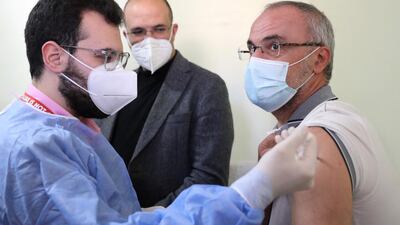Lebanon's teachers began receiving coronavirus vaccines on Monday, as part of a drive to inoculate the education sector.
The Ministry of Higher Education and Ministry of Public Health campaign began at the Lebanese Canadian Hospital in Beirut, giving doses to teachers of the Lebanese Baccalaureate programme (Grade 12), from both state and private schools.
Caretaker health minister Hamad Hassan said the vaccination programme has already started to bring down the number of deaths and lower hospital occupancy rates.
"We hope this impact will grow in coming days," he told local media.
The next stages of the vaccination drive will include Brevet instructors (Grade 9), followed by teachers of other classes, said Hilda Khoury, director of counselling and guidance at the Ministry of Education.
Baccalaureate and Brevet classes are set to return to schools soon, as their exams are scheduled for the summer.
The education sector is being inoculated using the AstraZeneca vaccine, of which Lebanon has secured 4.23 million doses.
More than 33,000 doses arrived on Wednesday, with the remaining shipments set to arrive gradually, according to the health ministry.
Teachers in Lebanon were initially listed as a "stage 3" group in the national vaccination plan – due to be inoculated in the group just before the general public.
But the education sector voiced concerns over the safety of staff and students, as they are expected to return to schools part-time, and demanded priority for vaccination.
"This is thanks to the efforts of all the educational bodies who persisted for their demands," Ms Khoury told The National.
The education sector suspended classes on March 8 in protest of the state’s inaction in the face of compounding crises.
A lack of funding and resources has shaken Lebanon's education sector, once a leading field in the region.
Teachers' other demands included additional funding, laptops and better internet connectivity to boost online learning.
Their strike ended on March 15, following promises from ministers.
Schools were supposed to reopen on March 22, but remain closed due to rising Covid-19 numbers.


